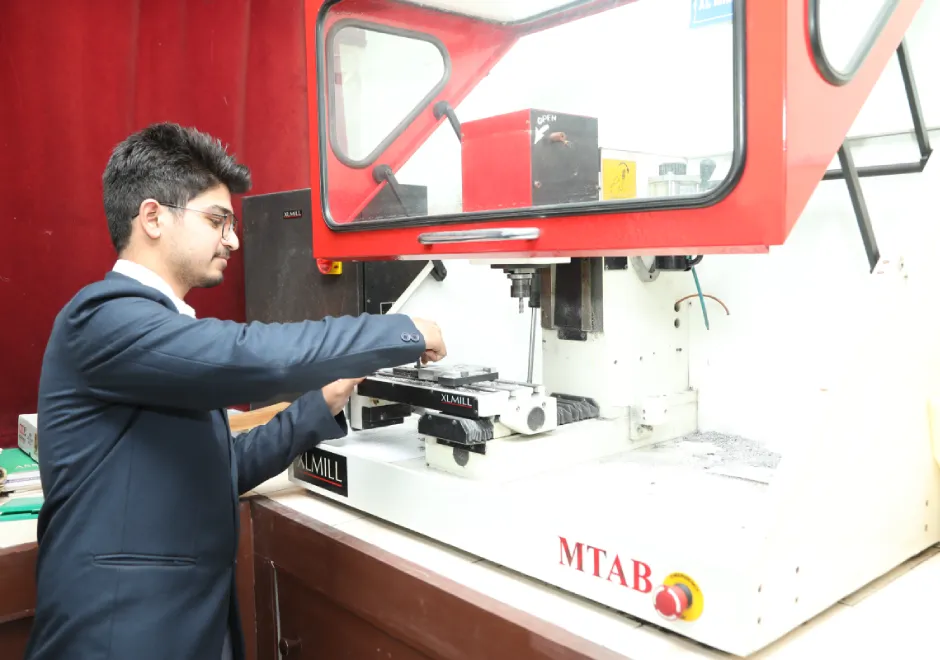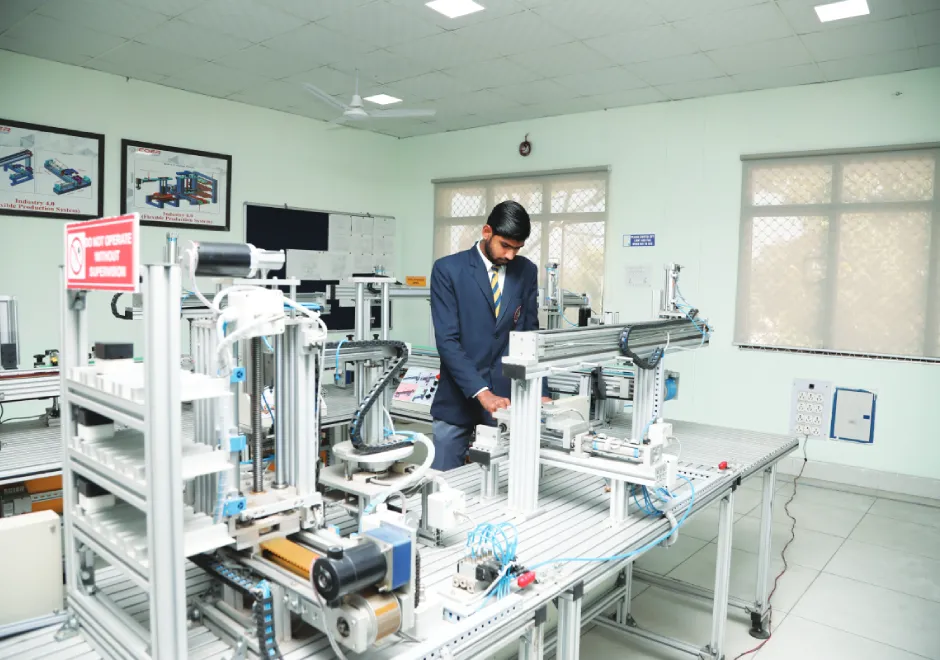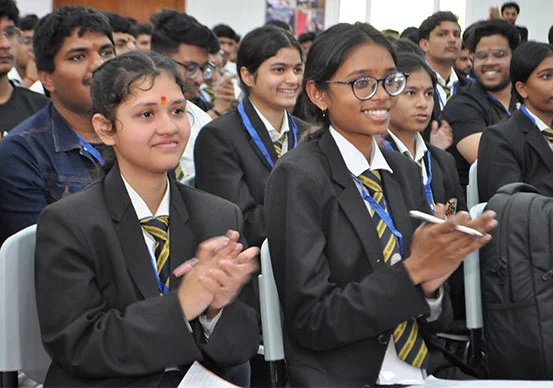
B. Tech Mechanical Engineering with Minor Specialization in Artificial Intelligence and Machine Learning (AIML)
Department of Mechanical Engineering
Eligibility Criteria |
B.Tech. 4 YearsCandidate must have passed 10+2 or equivalent from a recognized educational board with Physics, Mathematics as core subjects and third Subject from the Following Subjects (Chemistry / Computer Science / Electronics / Information Technology / Biology / Informatics Practices Biotechnology / Technical Vocational subject / Agriculture / Engineering Graphics / Business Studies / Entrepreneurship) with a minimum aggregate score of 45% (40% in case reserved category) in above subjects taken together. |
B.Tech. Lateral EntryCandidates, who have qualified UKSEE examination on merit basis, or have passed B.Sc. examination with Mathematics as one of the subjects, or securing minimum 60% marks in Diploma in Engineering or Equivalent Examination, are eligible for direct admission in second year. |
Duration |
4 Years |
3 Years |
| Apply Now |

The B.Tech. in Mechanical Engineering program provides a comprehensive education in mechanical systems, design, and manufacturing.
B.Tech in Mechanical Engineering with Minor Specialization in AI & ML offers a future-ready blend of traditional engineering principles with the power of artificial intelligence and machine learning. This program equips students with a strong foundation in mechanical systems while introducing them to intelligent algorithms, predictive analytics, and automation techniques. Through hands-on projects and interdisciplinary learning, students gain the ability to apply AI & ML tools in areas such as robotics, smart manufacturing, predictive maintenance, and design optimization. Graduates are well-prepared to meet the demands of modern industries where innovation and data-driven solutions are key to success.
Apply NowAdmissions 2026
Find your path to Success
Curriculum
-
Engineering Mathematics
-
Basics of Electrical and Mechanical Engineering
-
Information and Communication Technology
-
Work Study and Ergonomics/Alternate Automotive Fuels & Emission /Unconventional manufacturing Proces
-
Innovation and Design Thinking
-
Logic Building in C++ and Foundation of Professional Development
-
Engineering Drawing with Auto CAD
-
Tribology
-
Engineering Nanotechnology
-
Engineering Mechanics
-
Computer Integrated Manufacturing/Emerging Technologies/Aerospace Engineering
-
Workshop Technology
-
Logic Building in Python and Reasoning Concepts
-
CAD Modelling
-
Material Science and technology
-
Fluid Mechanics and Machinery
-
Engineering Thermodynamics
-
Product Design Development/Quality Control and Assurance/Production Planning and Control
-
Open Elective
-
Hydraulics and Pneumatics
-
Fluid Mechanics and Material Science, and Analytical Skills and Professional Communication
-
Environmental Science & Energy Management
-
Evaluation of Internship I
-
Strength of Materials
-
Theory of Machines
-
Manufacturing Science and Technology I
-
Renewable Energy Technology ,Lean Manufacturing and Six Sigma, Operations Management
-
Open Elective
-
Strength of Materials and Manufacturing Science and Project Building and Career Preparation
-
Applied Thermodynamics
-
Measurement & Metrology
-
Manufacturing Science and Technology II
-
CAD/CAM, Robot dynamics and its applications, Failure Analysis of Mechanical Components
-
Open Elective
-
Applied Thermodynamics and Manufacturing Sciences and Career Advancement
-
Evaluation of Internship II
-
Refrigeration & Air Conditioning
-
Heat and Mass Transfer
-
Design of Machine Elements
-
CAM and Industrial Automation ,Vehicle body Engineering & Safety, Mechanical Vibration
-
Open Elective
-
Heat and Mass Transfer and Machine Design and Professional Portfolio and Capstone Project
-
Industrial Engineering
-
Operation Research
-
Power Plant Engineerin
-
HVAC Systems, Computational Fluid Dynamics, Finite Element Method
-
Open Elective
-
Evaluation of Internship III
-
Automobile Engineering
-
Additive Manufacturing Processes
-
Energy Conservation
-
Open Elective
-
Project
Career Path
B.Tech Mechanical Engineering prepares students with the necessary skills and knowledge to design, develop, and maintain mechanical systems and machinery.
- Manufacturing Engineer
- Quality Control Engineer
- Research and Development Engineer
- Production Manager
- Maintenance Engineer
- Sales Engineer
- Project Engineer
- Automotive Engineer
- Aerospace Engineer

Program Outcomes POs
-
PO1
Engineering Knowledge: Apply knowledge of mathematics, science, engineering fundamentals, and an engineering specialization to solve complex engineering problems.
-
PO2
Problem Analysis: Identify, formulate, review research literature, and analyze complex engineering problems reaching substantiated conclusions using first principles of mathematics, natural sciences, and engineering sciences.
-
PO3
Design/Development of Solutions: Design solutions for complex engineering problems and design systems, components, or processes that meet specified needs with appropriate consideration for public health and safety, cultural, societal, and environmental considerations.
-
PO4
Investigation of Complex Problems: Conduct investigations of complex problems using research-based knowledge and research methods, including design of experiments, analysis, and interpretation of data, and synthesis of information to provide valid conclusions.
-
PO5
Modern Tool Usage: Create, select, and apply appropriate techniques, resources, and modern engineering and IT tools, including prediction and modeling, to complex engineering activities with an understanding of the limitations.
-
PO6
The Engineer and Society: Apply reasoning informed by the contextual knowledge to assess societal, health, safety, legal, and cultural issues and the consequent responsibilities relevant to the professional engineering practice.
-
PO7
Environment and Sustainability: Understand the impact of professional engineering solutions in societal and environmental contexts and demonstrate the knowledge of and need for sustainable development.
-
PO8
Ethics: Apply ethical principles and commit to professional ethics and responsibilities and norms of the engineering practice.
-
PO9
Individual and Team Work: Function effectively as an individual and as a member or leader in diverse teams and in multidisciplinary settings.
-
PO10
Communication: Communicate effectively on complex engineering activities with the engineering community and with society at large, such as being able to comprehend and write effective reports and design documentation, make effective presentations, and give and receive clear instructions.
-
PO11
Project Management and Finance: Demonstrate knowledge and understanding of the engineering and management principles and apply these to one's own work, as a member and leader in a team, to manage projects and in multidisciplinary environments.
-
PO12
Lifelong Learning: Recognize the need for, and have the preparation and ability to engage in independent and lifelong learning in the broadest context of technological change.
Program Specific Outcome PSOs
-
PSO1
The students will acquire a comprehensive understanding of concepts, analysis, operation and performance of all major aspects of mechanical engineering such as manufacturing process & industrial automation, thermal engineering, refrigeration & air-conditioning systems and machine design.
-
PSO2
The students will have knowledge of analytical tools for developing modeling and simulation of given problems.
-
PSO3
The student will have rigorous training on experimental support for theoretical concepts.
-
PSO4
The students will have acquired the ability to understand the scope of research work in major streams such as production engineering, renewable energy resources, thermal engineering and design of machine elements.
Program Educational Objectives PEOS
-
PEO1
To enhance the foundation and the knowledge-base of students in various fields of mechanical engineering and to make them capable for effectively analyzing and solving the problems associated in this field.
-
PEO2
To deliver comprehensive education in mechanical engineering to ensure that the students have core competency to be successful in industry or research laboratories and motivate them to pursue higher studies and research in interrelated areas.
-
PEO3
To encourage the students to take up real life and/or research related problems and to create innovative solutions of these problems through comprehensive analysis and designing.
-
PEO4
To provide an academic environment that gives adequate opportunity to the students to cultivate lifelong skills needed for their successful professional career.
Value Added Programs (VAPs)
| Semester | Name of VAP |
|---|---|
|
|









